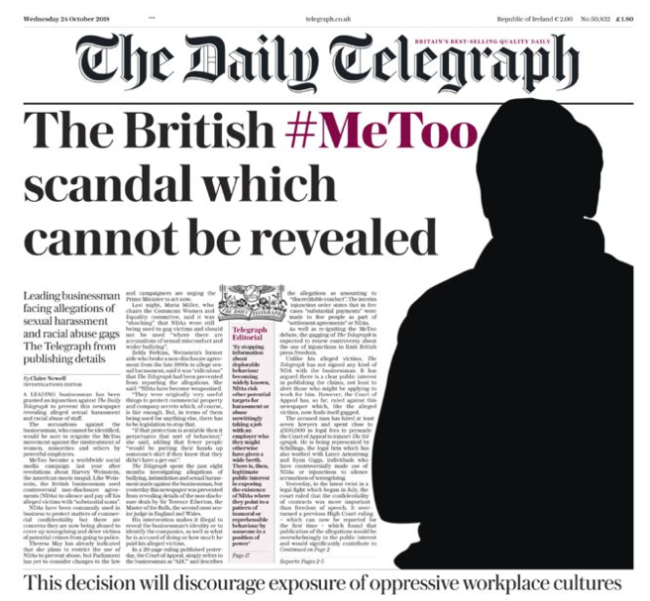The British #MeToo and other #iBelieve witch-hunts
The Daily Telegraph has been legally gagged from publishing allegations of sexual harassment and racial abuse made against a top businessman. Is that fair? We usually get to know the name of the accused in such case but not the name of the accuser. the BBC once hired a helicopter to get to the accused first. The paper’s story is billed, rather unappealing, as the “British #MeToo scandal”, what many see as a divisive movement, one rooted in sexual misconduct allegations about Hollywood producer Harvey Weinstein. It was ‘Time’s Up’ for sexual aggressors – time to divide leering men who use power to abuse, belittle and intimidate women from, well, the rest of us.
The writer Lionel Shriver said #MeToo was “important to begin with to expose some of these real malefactors”, but then as she told an audience at the Cheltenham Literary Festival:
“Then it took a turn and suddenly we were talking about bad dates and bad taste or making crass remarks and it trivialised itself and I thought that was really regrettable. I don’t like the feeling that now everyone has to have their story of some kind of terrible sexual abuse in order to be able to have an opinion about any of this stuff. I don’t want younger women to locate their sense of power in their weakness, in their fragility. I think the movement has run its course and we can pretty much call time on it now.”
Whereas feminism was once about women seeking equality and opportunity through their resilience, strength, modern feminism is about seeking victimhood and demanding special zones and rights. Shriver says MeToo encourages women to “locate their sense of power in their weakness, in their fragility”. She also said: “I am concerned that we are increasingly wont to confuse genuine abuse of power in the workplace with often distant memories of men who have made failed – ‘unwanted’ – passes.”
The Telegraph would love to tell readers the accused man’s name. But maybe not knowing is better than knowing because it allows the Telegraph to make a cause from could otherwise be a good bit of gossip. “The public have a right to know when the powerful seek to gag the vulnerable,” says the paper’s leader. We learn that the accused man spent “close to £500,000 in legal fees”. Who knew that saying nothing could cost so much?
The paper lines up the guns:
A businessman has used NDAs [Non Disclosure Agreements] in at least five instances to pay employees substantial sums to stop them accusing him of sexual harassment and racial abuse. He has used considerable resources to fight disclosure, achieving an interim injunction preventing publication.
Interesting to know what pressure was applied on the alleged victims to take the money? A QC tells the paper: “A lot of claimants are forced to enter NDAs because of the sheer cost and unpredictability of litigation.” To nothing of the huge stress of going to court. But the rich can afford it. So is it one rule for them and another for us?
And what of gender? Christina Hoff Sommers, host of The Factual Feminist noted:
Powerful men are falling left and right – but not because women are second-class citizens. Just the opposite. Girl Power is real. Instead of carrying on about how frightened and degraded we are, maybe it’s time to acknowledge the truth: in 2017, we can destroy almost any man by a single accusation.
To believe the women without thinking and circumspection is surely no good. To call out illegal behaviour by pathetic men is good.
Back to the scoop, then, and there’s an inkling that however much the Tele wants to tell us the alleged cretin’s name, not telling us puts it on the side of the angels:
A High Court judge had refused to grant an injunction. But the Court of Appeal has overturned that ruling and imposed an injunction which remains in place pending a full hearing in the New Year. We have, in other words, been gagged, contrary to the age-old principle against prior restraint of the press. If the businessman had used defamation laws to block publication, he would not have been granted an injunction since this newspaper would have declared its readiness to prove the truth of the allegations.
The paper ekes four more stories from the gagging order: “Schillings: The ‘attack dog’ firm that acted for Giggs, Terry and Ronaldo”; “The day press freedoms received a devastating blow”, “How gagging orders became the MeToo war’s weapon of choice” and “This decision will discourage exposure of oppressive workplace cultures”. A huge deal. Papers need a campaign and the Telegraph has one.
Stop Press – this is important: “it is now illegal to reveal the businessman’s identity or to identify the companies, as well as what he is accused of doing or how much he paid his alleged victims”. How this pans out on twitter and areas outside the judiciary’s control remain to be seen. In 2011, the Liberal Democrat MP John Hemming “used parliamentary privilege to name Ryan Giggs as the footballer identified on Twitter as having brought an injunction to prevent publication of allegations he had an affair with a former reality TV star.” They might do it there. But don’t do it here.
The Telegraph says there is “a clear public interest in publishing the claims, not least to alert those who might be applying to work for him.” But innocence is presumed, of course. And if what we read is true, well-fed lawyers working for him were not mired by the accusations. And to repeat this to make it no less true: believe what you like, but innocent must be presumed.
Posted: 24th, October 2018 | In: Key Posts, News 0 Comments | TrackBack | Permalink



